All posts by Sasha Chait
Students Published: Local High School Students First to Describe New Viruses in New York City’s Pigeons
Actionable data on avian diseases will help make New York City safer for humans and wildlife
For immediate release, April 8, 2022
New York, New York The New York City Virus Hunters (NYCVH), a collaborative community science initiative, has conducted the first large-scale virus surveillance project of urban wild birds in the New York City (NYC) metropolitan area. A paper published in Microbiology Spectrum reports the findings of five public high school students who, under the mentorship of virologists, veterinarians and wildlife rehabilitators, addressed the lack of extensive baseline data for viruses present in urban wild birds.
Screening wild birds to understand what viruses they might carry is of increasing importance as New York lies on a major bird migratory route, the Atlantic Flyway, but there is limited information on what viruses circulate endemically in migratory and resident birds of NYC.
After collecting and screening hundreds of samples since Fall 2020, the students found that 4.1% of tested birds screened positive for avian paramyxovirus (APMV-1), also known as Newcastle disease virus. The great majority of the APMV-1-positive birds were pigeons, and one was an American woodcock. The program team also isolated two live viruses—the first ever described for the Big Apple—that can serve as domestic reference strains for future APMV-1 vaccine developments for poultry. Birds infected with APMV-1 often show no symptoms, but when they do, symptoms include becoming lethargic and reluctant to move, and having difficulty standing or holding their head upright. Despite available vaccines to prevent Newcastle disease in domestic poultry in the United States, it still remains one of the main poultry diseases in commercial and backyard chickens.
“It appears that avian paramyxoviruses circulate in NYC pigeons. While they are not harmful to humans, understanding local APMV-1 strains is important for the poultry industry and occupational safety. This virus can cause pinkeye in humans in rare cases; therefore, NYC residents should refrain from handling or feeding wild birds, and poultry and slaughterhouse workers should always be provided with appropriate protective equipment as per state public health guidelines,” says Isabel Francisco, DVM, first author on the paper.
Florian Krammer, Professor in Vaccinology at the Icahn School of Medicine at Mount Sinai, points out the important scientific implications of the NYCVH program. “This is a great initiative from a training perspective, but we are also doing real science here. It looks like the students isolated AMPV-1 strains that belong to two different lineages. This is the first such data ever recorded for New York City. This work becomes even more relevant with the emergence of highly pathogenic avian influenza virus of the H5N1 subtype on the East Coast. We need to know which viruses are present in our urban birds.“
“The concept of ’One Health’ puts forward that animals and people, plants and the environment, are inextricably connected. When a pigeon from a park is sick from environmental lead poisoning, the young children playing in the park may suffer debilitation from the same toxin. This spring, “Bird Flu” struck up and down the East Coast. By monitoring the occurrence of H5N1 in wild birds, we are safeguarding our domestic flocks and our food supply,” comments Rita McMahon, Director Wild Bird Fund.
“The present study demonstrates the role of community science as a sentinel for urban viral surveillance initiatives that potentially could detect emerging infectious disease. We need more people on the ground to help us map urban viral diversity, and there is no better way to achieve this than by co-creating a program with the community and involving them in every step” says Christine Marizzi, BioBus Director of Community Science and senior author of the paper.
Reflecting on his time in the program, Joel Gonzalez, one of the five high school student co-authors from the South Bronx, NYC, and currently at Brown University, says “Go for it. We need more people like us in NYCVH and STEM. Trust me, it will be worth it.”
And Djenabou Diallo, a senior at Central Park East High School who lives in Queens, NYC, and another paper co-author, adds “I just recently finished applying to college and am currently receiving acceptances and NYCVH made the college application so much easier. When asked about things I’m passionate about or a favorite extracurricular etc., I find myself always going back to this program.”
Generously funded by Flu Lab, which funds and advances innovative solutions to influenza challenges, the initiative ran over two years and will continue to generate actionable data on avian diseases to make New York City safer for both humans and our precious wildlife.
About BioBus
BioBus helps K-12 and college students in New York City discover, explore, and pursue science. We focus on students excluded from the scientific community due to factors such as race, gender, economic status, and physical access. Through this work, we envision a world where all people have the opportunity to reach their full scientific potential. We’ve reached 300,000 students at more than 800 schools since 2008, primarily in NYC public and charter schools and as far away as New England, California, and even Egypt and Jordan. BioBus students connect with scientists from diverse backgrounds, learn lab and research skills, practice science communication, and take steps to become the next generation of scientists and problem-solvers, making the world better for all of us. Our students access and become part of the scientific community through introductory science labs aboard our mobile labs at their schools; after school, weekend, and summer programs; and year-long internships. We offer programs city-wide with a focus on Harlem, the South Bronx, and the Lower East Side.
About the Krammer Laboratory at Icahn School of Medicine at Mount Sinai
The Krammer Laboratory studies cross-reactive antibody responses to the surface glycoproteins of antigenically variable RNA viruses. Our main focus is on influenza viruses, but we are also interested in antibody responses to coronaviruses, hantaviruses, filoviruses, and other emerging RNA viruses. Work done in the laboratory includes the expression and characterization of viral glycoproteins, generation of glycoprotein-directed monoclonal antibodies, and the characterization of the interaction between antibodies and surface glycoproteins; we are specifically interested in analyzing conserved epitopes and—through detailed studies—aim to elucidate the mechanisms by which these antibodies protect the host from viral infection and disease. The final goal is to translate these findings into novel vaccines and therapeutics.
About Wild Bird Fund
Wild Bird Fund is a state and federally licensed 501(c)(3) that cares for the injured, ill and orphaned wildlife of New York City. Medical care includes radiographs, diagnostic testing, surgery, medication, bandaging, splinting, physical therapy, feeding and sheltering, for as many as 9,000 animals a year. Our mission is twofold: to provide veterinary care and rehabilitation to native and migrant wildlife so that they can be released back into the wild, and to educate New Yorkers about the rich diversity and environmental needs of the city’s precious wildlife.
About Flu Lab
Flu Lab’s mission is to fuel bold approaches to defeat influenza. We power transformative approaches to advance influenza research, promote open science principles, and explore new influenza solutions. To achieve this, Flu Lab seeks out high-impact opportunities, makes investments and grants, evaluates results, and provides opportunities for shared learnings. We support initiatives that range from big and bold efforts to smaller, highly creative programs.
Contact information
Christine Marizzi, Ph.D., BioBus Director of Community Science, christine@biobus.org
Ben Dubin-Thaler on the Successful Nonprofits Podcast
Curious about the history of BioBus and the ups & downs of operating a vehicle? Listen to BioBus Executive Director & Founder, Ben Dubin-Thaler, PhD, on the Successful Nonprofits podcast!
Stories of Impact: Simons Foundation Video Features BioBus
“Discovering microscopic worlds on board a bus isn’t something that most people can say they’ve done in their lives. However, junior scientist Jaylene Muñoz — and countless other New York City K-12 students — have done just that, thanks to BioBus, a growing fleet of mobile science labs that reach students who may not otherwise have access to meaningful science engagement. Fitted with state-of-the-art microscopes and other equipment, BioBus helps these students realize their full science potential.” Read more.
Temboo Stories of Community Engagement Featuring Community Scientist Ashley Pirovano
Jessica Califano from BioBus partner Temboo interviewed Ashley Pirovano:
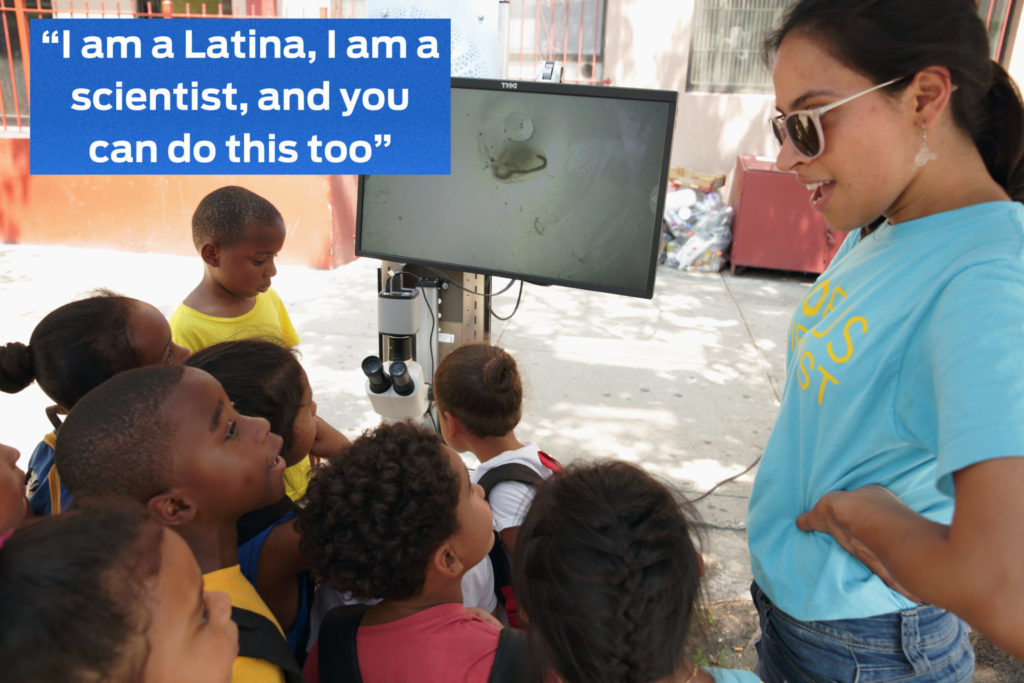
“If you’re lucky, at some point in during your time in school you encountered a teacher that ignited a spark in you. A teacher who made a subject that you may never have been very interested in, somehow extraordinarily fascinating. Maybe even one who helped you rethink what was possible for your future, and altered the course of your life completely.
Ashley Priovano is one of those educators. As a Community Scientist at BioBus, her role is to spark an interest in science in students of all ages every day.
As part of our ongoing Stories of Community Engagement Interview Series, I spoke with Ashley about her journey from ballerina to scientist, how her work opens the eyes of students to the wonders of science, and what she hopes to see for the future.“
Read the interview on the Temboo Blog. Ashley shares the history of BioBus and tells the story Dr. George Washington Carver who created the original mobile lab, talks about our Junior Scientists and the DIY microscope, shares and tells us how she got into science after thinking she would be a dancer.
Students Published! NYC Virus Hunters Pre-Print Publication
The first publication from our BioBus New York City Virus Hunters community science program is out! Our research team composed of high school students, veterinarians, seasoned virologists and bird rehabilitators discovered interesting viruses in NYC pigeons! Read the publication to learn about their research.
Read more about the NYC Virus Hunters in the NYTimes article and new video.
Molecular Ideas: Driving STEM Education with BioBus
Jack Fischer from Molecular Ideas spoke to Community Scientist Francesca Anselmi and wrote about BioBus:

Welcome to Molecular Ideas and thank you for sharing your time with us. We’re back today with a Startup Showcase for an organization dedicated to empowering students, parents, and communities with scientific literacy through hands-on engagement.
“There’s this crazy group of scientists in New York City who teach kids on a bus.”
That was how both I and Dr. Francesca Anselmi, Ph.D. heard about BioBus. Yet, such a simple statement could never hope to encompass this organization’s unique method for teaching science and instilling a passion for it in dozens of communities. Francesca is BioBus’ Chief Scientist, who I had the pleasure of sitting down with to discuss the organization’s unique positioning and scalable model for STEM (Science, Technology, Engineering, and Math) education.
Visit Molecular Ideas to read more. Jack shares the numbers that highlight the lack of representation in STEM fields and Francesca tells the story of two BioBus students and discusses some of our diversity, equity, and inclusion work.
With $400k Grant from Manton Foundation, BioBus Launches in New England
The science education nonprofit, started in New York City in 2008, will bring hands-on inquiry-based science learning to thousands of students across New England
For immediate release, October 12, 2021
Somerville, Massachusetts Elementary students at West Somerville Neighborhood and Winter Hill Community Innovation public schools are in for a treat. Mollie Thurman, BioBus Chief Scientist, will be on site at both schools every week this fall with research science tools and Harvard PhD student volunteers. But this isn’t a one-time chance for students to learn through hands-on science – or exclusively for these two schools. The Manton Foundation, a family foundation with grantmaking interests primarily in New England, recently awarded a two-year grant of $398,750 to BioBus, Inc. The grant, along with other philanthropic and academic support, is funding BioBus to launch permanently in Boston and the greater New England area, the organization’s first major expansion outside of New York City. Through this expansion, BioBus will bring science programming that is responsive to community needs to thousands of students throughout New England. With BioBus, students will connect with academic scientists and the growing biotech industry, and start their own paths to become the next generation of scientists, innovators, and problem solvers.
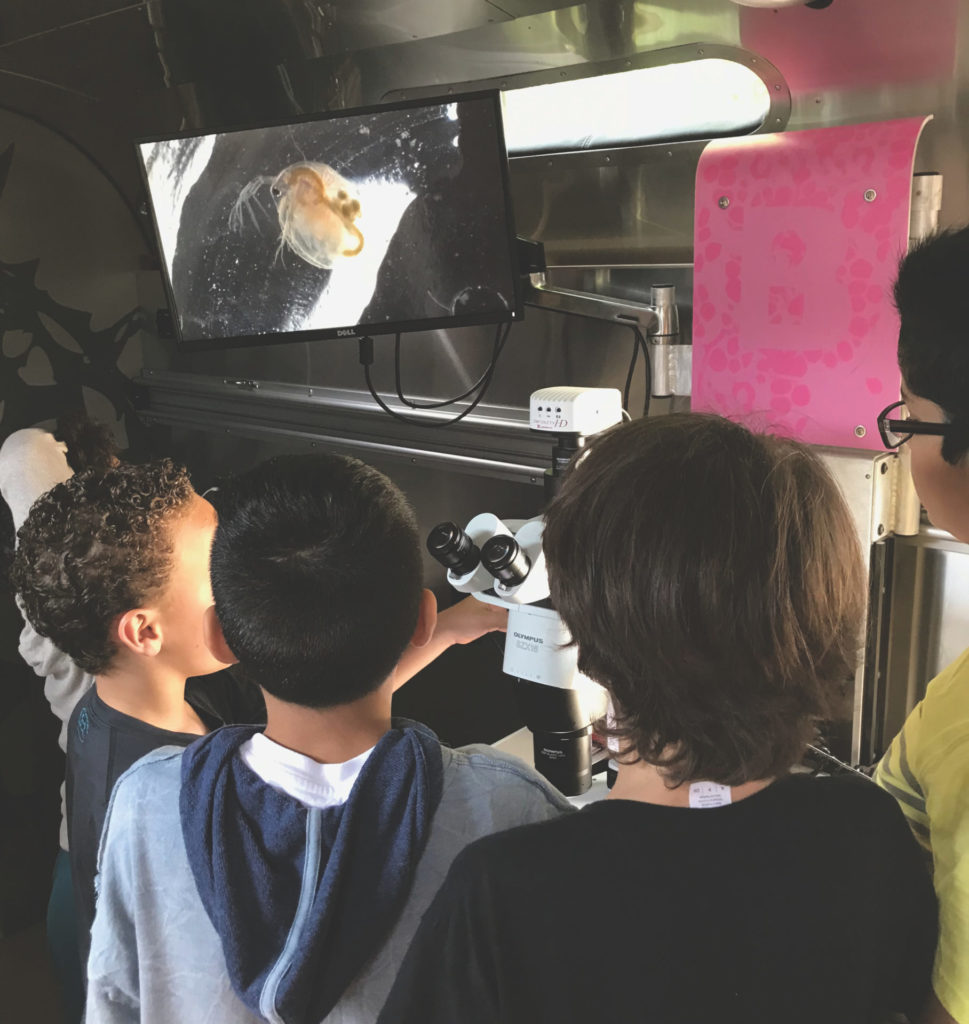
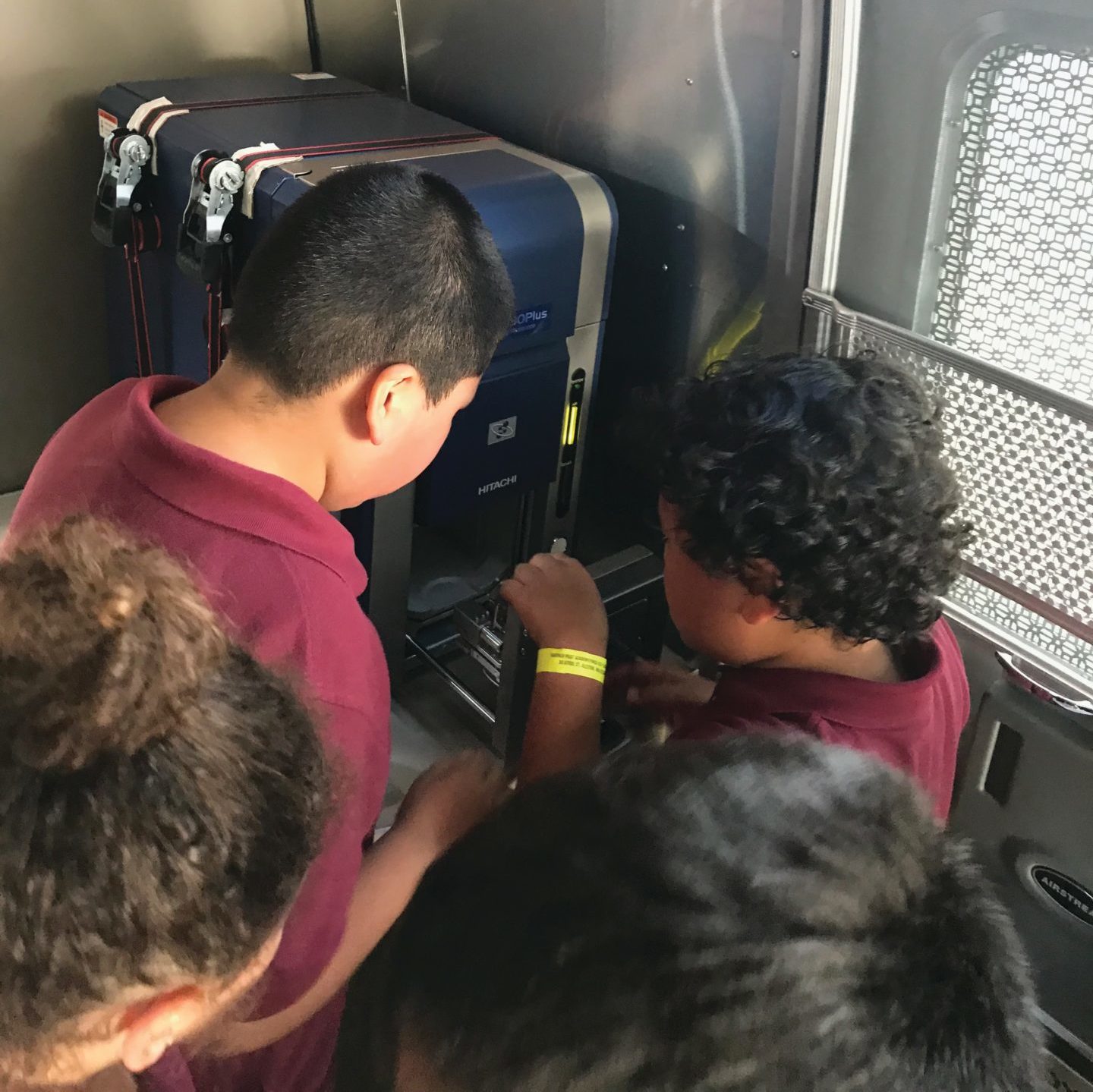
Students using research microscopes aboard a BioBus Mobile Lab in Somerville in 2018, including an electron microscope (right)
Since 2008, BioBus has helped more than 300,000 students become budding scientists. Over 80% of these students are from minority and low-income backgrounds. BioBus plans to bring expertise in science engagement and pedagogy to Boston students immediately, and within five years the team hopes to deploy BioBus New England, a new mobile laboratory to deliver programs across broader New England.
Already, through annual mobile laboratory visits, BioBus has reached over 1,800 students in the region and has attended events and conferences in Massachusetts, Connecticut, and Maine. These visits have led to strong partnerships with universities such as Harvard University Molecular & Cellular Biology and the Institute for Chemical Imaging of Living Systems at Northeastern University as well as the Somerville Public Schools. With this expansion, BioBus will develop partnerships with schools around New England.
Interested in getting involved and signing up for programs? If you or a school or organization you know wants to partner, work with, or donate to BioBus New England, please visit www.biobus.org/newengland, or contact Chief Community Scientist Mollie Thurman at mollie@biobus.org.
About BioBus
BioBus’s mission is to help K-12 and college students discover, explore, and pursue science. The organization focuses on students excluded from the scientific community due to factors such as race, gender, economic status, and physical access. Through this work, BioBus envisions a world where everyone can reach their full scientific potential.
BioBus was founded in 2008 as a group of volunteer scientists and a decommissioned San Francisco transit bus on a mission to bring hands-on science learning to students in New York City who could most benefit from it. Since those beginnings the organization has grown rapidly. Still relying on a steady influx of volunteer scientists, as well as partnerships with communities, schools, academic institutions, businesses, and individual supporters, BioBus has expanded its services to a full science engagement pathway from kindergarten through college.
Science At East Side: Unobstructed
by Lavon Sykes, January 2021 in The East Sider
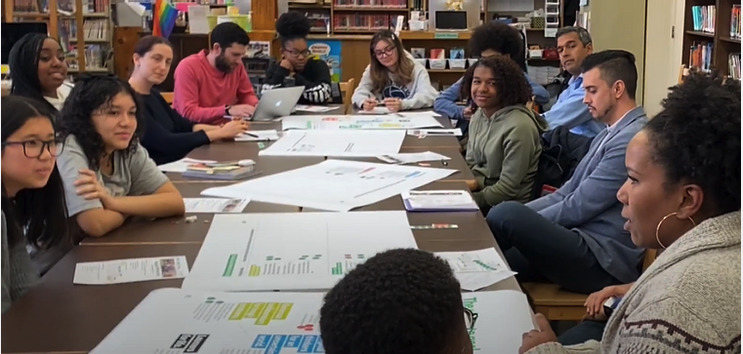
For most of the city, the past year has been lights out and doors shut. COVID-19 has been a great force in consuming nationwide morale, energy, and motivation. But, not for East Side’s team of BioBus students.
While many have been sitting on their couches watching Netflix all day, and resigning to the monotony of quarantine, a group of scholars have taken initiative to preserve and express their passions for science. Through BioBus, a program dedicated to imbuing the love of science in low-income minority students, East Side students have been able to reimagine STEM at our school.
East Side is fortunate enough to have won a $20,000 grant due to the work of these students in the Reimagine Schools contest, sponsored by philanthropic organization XQ and the DOE. The $20,000 will help “mentor 10 juniors who are going to do their PBATs in the Spring” by supplying them with high-tech microscopes ready to kickstart their “hands-on experience,” says Assistant Principal and STEM Coordinator Joseph Vincente.
The story’s ending, although grand, doesn’t fully underscore the hard work and dedication each student, Joe, and BioBus put into achieving their goals. Every week before the shutdown, the group met at the library to discuss redesigning the East Side STEM programs and building the East Village biology base in the vacated space outside the auditorium on the 11th street side of the school.
A student on the team, Recy Jordan, said, “Through BioBus and getting the grant it would help spread that [STEM] to others. I feel great that I was able to help support STEM at East Side.” With nothing but high hopes and the means to bring them to fruition, the team was disappointed and briefly set back by the city-wide shutdown. Joe stated, “Then the pandemic happened and it came to a halt.” Discussion of the competition, biology base ideas, and the in-person meetings were put on pause.
Their dedication paid off as the team continued to attend Zoom meetings, and the city contacted Joe to provide East Side with a “mini-grant.” This is the $20,000 grant that will allow research at East Side to continue with high-tech equipment. The full prize money, however, was unable to be offered due toCOVID, but there is a possibility that the competition will resume once normalcy is reached, and the possibility for the full prize fund would be on the table. Although nothing about $20,000 is mini, it still won’t be enough to fully fund the biology base project.
Joe hopes that the students, city, and donors will “have enough momentum to reenter the contest and win even more money.” For current students and alumni, the large space that gave a home to many missing kickballs, baseballs, hats, and papers may become a center for science and exploration at East Side.
We’re all rooting for our science team, and we hope that as the city can resume normalcy over the next few months, our passionate students can once again have fun with biology and science exploration in person. And hopefully, that comes with a side of the money needed to build the biology base.
Amid One Pandemic, Students Train for the Next (NYTimes + Video + Student Publication)
Researchers have banded together to find safe, virtual ways to teach the principles of microbiology and epidemiology.
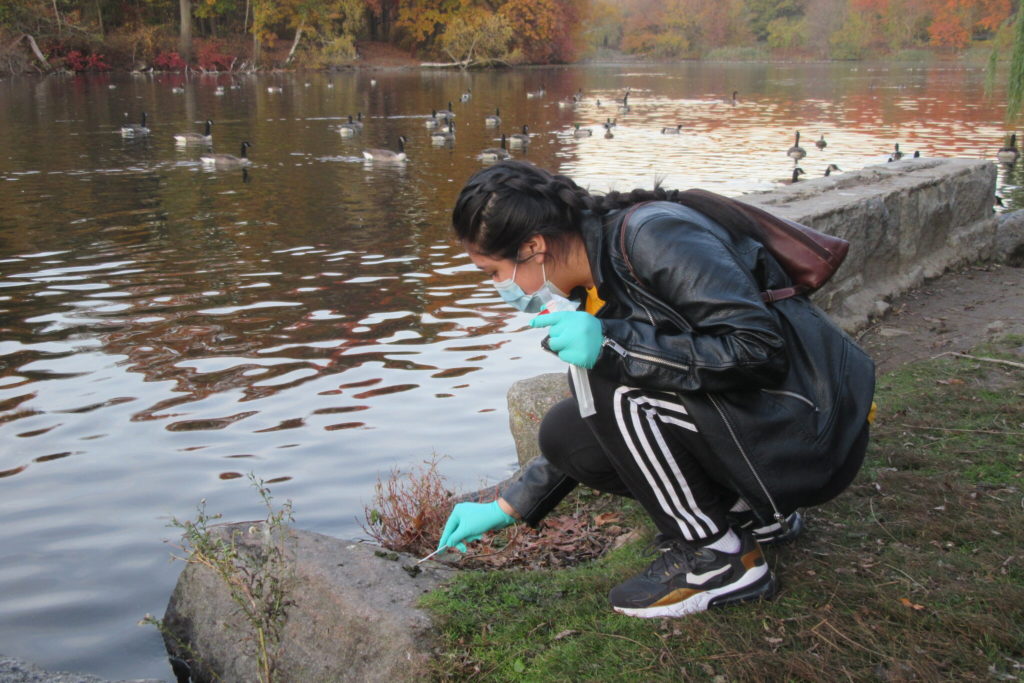
By Katherine J. Wu
Jan. 21, 2021, 5:00 a.m. ET
On a crisp afternoon in November, Teresa Bautista ventured into Van Cortlandt Park in the Bronx, N.Y., on the lookout for feces. It didn’t take long for Ms. Bautista, 17 — and, to her chagrin, her white Puma shoes — to hit some serious pay dirt.
Speckled all across the park’s grass was the greenish glint of goose droppings, which Ms. Bautista eagerly swabbed and swirled into a tubeful of chemicals. “This was my first time digging into poop,” she said. “It was really fun.”
Article continues in The New York Times. Read the press release for more information and check out the documentary short “Feathers Gone Viral” produced by Christine Lin.
The first publication from our BioBus New York City Virus Hunters community science program is out! Our research team composed of high school students, veterinarians, seasoned virologists and bird rehabilitators discovered interesting viruses in NYC pigeons! Read the publication to learn about their research.
